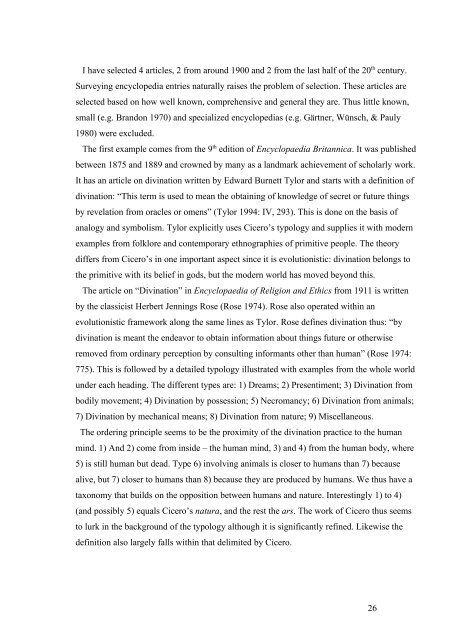The dissemination of divination in roman republican times
The dissemination of divination in roman republican times
The dissemination of divination in roman republican times
You also want an ePaper? Increase the reach of your titles
YUMPU automatically turns print PDFs into web optimized ePapers that Google loves.
I have selected 4 articles, 2 from around 1900 and 2 from the last half <strong>of</strong> the 20 th century.<br />
Survey<strong>in</strong>g encyclopedia entries naturally raises the problem <strong>of</strong> selection. <strong>The</strong>se articles are<br />
selected based on how well known, comprehensive and general they are. Thus little known,<br />
small (e.g. Brandon 1970) and specialized encyclopedias (e.g. Gärtner, Wünsch, & Pauly<br />
1980) were excluded.<br />
<strong>The</strong> first example comes from the 9 th edition <strong>of</strong> Encyclopaedia Britannica. It was published<br />
between 1875 and 1889 and crowned by many as a landmark achievement <strong>of</strong> scholarly work.<br />
It has an article on <strong>div<strong>in</strong>ation</strong> written by Edward Burnett Tylor and starts with a def<strong>in</strong>ition <strong>of</strong><br />
<strong>div<strong>in</strong>ation</strong>: “This term is used to mean the obta<strong>in</strong><strong>in</strong>g <strong>of</strong> knowledge <strong>of</strong> secret or future th<strong>in</strong>gs<br />
by revelation from oracles or omens” (Tylor 1994: IV, 293). This is done on the basis <strong>of</strong><br />
analogy and symbolism. Tylor explicitly uses Cicero’s typology and supplies it with modern<br />
examples from folklore and contemporary ethnographies <strong>of</strong> primitive people. <strong>The</strong> theory<br />
differs from Cicero’s <strong>in</strong> one important aspect s<strong>in</strong>ce it is evolutionistic: <strong>div<strong>in</strong>ation</strong> belongs to<br />
the primitive with its belief <strong>in</strong> gods, but the modern world has moved beyond this.<br />
<strong>The</strong> article on “Div<strong>in</strong>ation” <strong>in</strong> Encyclopaedia <strong>of</strong> Religion and Ethics from 1911 is written<br />
by the classicist Herbert Jenn<strong>in</strong>gs Rose (Rose 1974). Rose also operated with<strong>in</strong> an<br />
evolutionistic framework along the same l<strong>in</strong>es as Tylor. Rose def<strong>in</strong>es <strong>div<strong>in</strong>ation</strong> thus: “by<br />
<strong>div<strong>in</strong>ation</strong> is meant the endeavor to obta<strong>in</strong> <strong>in</strong>formation about th<strong>in</strong>gs future or otherwise<br />
removed from ord<strong>in</strong>ary perception by consult<strong>in</strong>g <strong>in</strong>formants other than human” (Rose 1974:<br />
775). This is followed by a detailed typology illustrated with examples from the whole world<br />
under each head<strong>in</strong>g. <strong>The</strong> different types are: 1) Dreams; 2) Presentiment; 3) Div<strong>in</strong>ation from<br />
bodily movement; 4) Div<strong>in</strong>ation by possession; 5) Nec<strong>roman</strong>cy; 6) Div<strong>in</strong>ation from animals;<br />
7) Div<strong>in</strong>ation by mechanical means; 8) Div<strong>in</strong>ation from nature; 9) Miscellaneous.<br />
<strong>The</strong> order<strong>in</strong>g pr<strong>in</strong>ciple seems to be the proximity <strong>of</strong> the <strong>div<strong>in</strong>ation</strong> practice to the human<br />
m<strong>in</strong>d. 1) And 2) come from <strong>in</strong>side – the human m<strong>in</strong>d, 3) and 4) from the human body, where<br />
5) is still human but dead. Type 6) <strong>in</strong>volv<strong>in</strong>g animals is closer to humans than 7) because<br />
alive, but 7) closer to humans than 8) because they are produced by humans. We thus have a<br />
taxonomy that builds on the opposition between humans and nature. Interest<strong>in</strong>gly 1) to 4)<br />
(and possibly 5) equals Cicero’s natura, and the rest the ars. <strong>The</strong> work <strong>of</strong> Cicero thus seems<br />
to lurk <strong>in</strong> the background <strong>of</strong> the typology although it is significantly ref<strong>in</strong>ed. Likewise the<br />
def<strong>in</strong>ition also largely falls with<strong>in</strong> that delimited by Cicero.<br />
26


